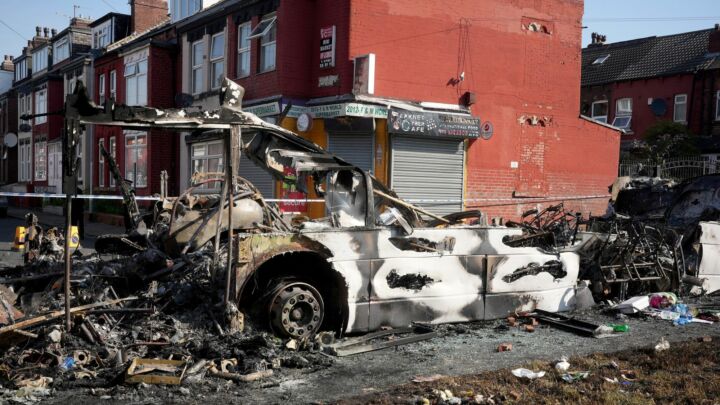
How California became a warning to the world
A new dominant class of oligarchs and woke bureaucrats has bled the Golden State dry.
Want to read spiked ad-free? Become a spiked supporter.
For generations, California has led the world in creating cutting-edge ideas and opportunities for newcomers. As actor-turned-governor of California Arnold Schwarzenegger once said:
‘We are the modern equivalent of the ancient city-states of Athens and Sparta… Not only can we lead California into the future… we can show the nation and the world how to get there.’
Today, the Golden State once again foreshadows the future, but this time it should be read as a warning.
Many still see California as the home of a ‘new progressive era’. It is often viewed as an exemplar of social equity, one that reflects, as a New York Times column put it, ‘the shared values of our increasingly tolerant and pluralistic society’. In truth, far from embodying an egalitarian ethos, it is pioneering a new kind of almost feudal society. A relative handful of oligarchs and a vast bureaucratic ‘clerisy’ lord it over a massive class of what are essentially serfs.
California is not only home to by far the highest number of billionaires in the US. But it also suffers the highest proportion of Americans living in poverty and the widest gap between middle- and upper-middle-income earners of any state. It endures among the US’ highest rates of unemployment, as well as massive net outmigration, an exodus that has increased sharply since 2019. It also has 30 per cent of the nation’s homeless population, with some now living in ‘furnished’ caves.
The key to understanding California’s neo-feudal reality lies in its changing economy. A decade ago, its largest firms included a host of aerospace, finance, energy and service firms. Today, the energy firms have largely disappeared – Chevron remains, though it has been moving more operations to Houston, Texas. Only one top aerospace firm, SpaceX, is still headquartered there, and it has also moved many operations to Texas. As Jerry Brown, who was governor of California for 16 years in two different periods, once warned, the state has a precarious ‘Johnny one-note’ economy. It is based almost entirely on returns to real estate, tech IPOs and the value of privately held ‘unicorn’ startups.
Even as fortunes are made by a handful of tech investors and entrepreneurs, most industries are stagnating or on their way out. Joseph Vranich and Lee Ohanian, in a Hoover Institution report released last year, observed that in 2020, Texas had seven times the number of company-initiated capital projects as California. Additionally, from 2018 to 2021, 352 companies headquartered in California moved their headquarters elsewhere.
The damage has been particularly severe in blue-collar sectors. This has proven a disaster for working-class Californians. Even without adjusting for costs, no Californian metro area ranks in the US top 10 in terms of well-paying, blue-collar jobs. But four – Ventura, Los Angeles, San Jose and San Diego – sit among the bottom 10.
For the majority of Californians today, most jobs are of a distinctly peasant quality. Since 2008, the state has created five times as many low-wage jobs as high-wage jobs. Even in Silicon Valley, once a byword for ambition and innovation, most new jobs earn less than $50,000 annually. That is far below what is needed to live a decent life in this ultra high-cost area. According to the Brookings Institution, San Francisco, arguably America’s premier high-tech city, has experienced the most rapid growth in inequality from 2007 to 2012.
Unable to provide upward mobility for most, California has chosen to expand what Marx described as ‘the proletarian alms-bag’ for the masses, who are increasingly disconnected from the state’s economy. The state spends a larger share of its budget on welfare than virtually any other state. Rather than seek to expand the economic pie, the oligarchic classes prefer an expansion of redistribution. They favour concepts like a ‘universal basic income’ or subsidies for basics like rent and electricity. Some claim California will be able to foot the bill with profits made from artificial intelligence. Once the epitome of competitive capitalism, the tech industry now promotes, as one Silicon Valley wag put it, ‘feudalism with better marketing’.
Gavin Newsom, California’s governor and prince of the oligarchic elite, seems determined to double down on his attempt to shape California as the model for the ‘progressive’ future. ‘Unlike the Washington plutocracy’, he proclaims, ‘California isn’t satisfied serving a powerful few on one side of the velvet rope’.
Such rhetoric crashes against reality. Newsom’s high-tax, regulation-heavy regime is driving enormous poverty. The state’s ethnic-minority communities are suffering most. Ignoring the interests of these people, California legislators and regulators enact proposals for the almost total elimination of fossil fuels. That includes a more rapid replacement of gas and diesel cars with EVs by 2035, and an earlier deadline to achieve the Valhalla of Net Zero than most other states.
Draconian climate-change policies, now a central part of Democratic Party dogma, have driven California’s decline. Latinos are particularly impacted. Soledad Ursúa, the author of a new Chapman report, notes that Latinos are now deeply involved with jobs like construction, transport and agriculture – what she calls the ‘carbon economy’. In these industries, unlike writing software or making movies, energy prices are often a paramount concern. Latino workers are over-represented in these industries nationwide. But in California they account for more than half of all transport-sector workers, as well as in manufacturing and construction.
This, as attorney Jennifer Hernandez explains, has created a kind of ‘green Jim Crow’ that disproportionately hurts working-class, ethnic-minority families. Californians have the highest energy prices in the continental US and energy poverty is particularly rife among the heavily Latino inland areas. Recently, the California Air Resources Board, the primary executor of California’s climate policies, projected that these policies will result in significant income declines for individuals earning less than $100,000 annually, while boosting incomes for those above this threshold.
These policies are a disaster for many. Today one in five Californians – many working – lives in poverty (using a cost-of-living adjusted poverty rate). The Public Policy Institute of California estimates another fifth live in near-poverty – roughly 15million people in total. With the exception of Asians, the state’s racial minorities do far worse – in education, incomes and homeownership – than they do virtually anywhere else in the country.
Rather than address class issues, California’s progressive project focusses on issues like gender, abortion and race. All provide excellent ways to virtue-signal without threatening the ruling cabal of the oligarchical elite, the government bureaucracy and the political class. This has led California to pass such measures as mandates for stores to have gender-neutral toy sections and allowing children to change genders without parental approval.
But it is the race card that California’s feudalists rely on most to appeal to both the guilt-ridden white progressives, as well as the non-white majority. Their regulatory and tax policies may undermine the aspirations of minorities, notably Latinos and African Americans, but they offer support for race-based affirmative-action measures. This is despite the fact that Californian voters have twice rejected such efforts by wide margins.
Even with these restrictions, the state’s massive bureaucracy continues to work on imposing mandatory woke quotas, no matter the cost. In 2020, the UCLA school of Medicine handed admissions to a DEI (diversity, equity and inclusion) administrator who admitted less than stellar candidates. Many of these have failed preliminary exams to do clinical work, helping to lower the school’s ranking from sixth to 18th place.
Of course, not every ‘person of colour’ can go to medical school. California progressives hoped to entice broader support by introducing a bill for slavery reparations earlier this year. This is an odd move given that California was never a slave state and only a small number of African Americans lived there in the Jim Crow area. In truth, the only large-scale slavery took place under the Spanish. If reparations are to be paid for the enslaved native Americans, the bill should go to Madrid rather than Sacramento or Washington.
This hasn’t stopped the state’s nine-member Reparations Task Force. Last month, it recommended state payments of $223,200 to black descendants of slaves living in California. The bill for this could top $569 billion. Equally terrifying, the Racial Justice Act 2020 came into effect in California this year, allowing anyone serving time for a felony to retroactively challenge their conviction and sentencing, on the basis of systemic racial bias. This will essentially allow race to become a major deciding factor in convicting and sentencing criminals in California.
Today, even in face of a record $68 billion deficit and a weak economy, the state’s political establishment seems reluctant to curb its spending or regulatory impulses. Under the new state budget, which Newsom claims has no new tax increases, an estimated $18 billion is expected to be raised from indirect tax hikes on businesses. The California Legislative Analyst’s Office predicts continued operating deficits through 2028, a consequence of per-capita spending tripling over the past 50 years.
Rather than change course, Newsom and his allies employ budget tricks to deal with the deficit. The governor has even blamed climate change for much of the problem. California’s Democrats are not remotely serious about fixing the budget. Redistribution continues to ace out wealth creation, as epitomised by a pledge to provide undocumented immigrants, hard-working or not, with free healthcare. Meanwhile, middle- and working-class Californians pay ever higher premiums.
These new costs are being imposed even as the high-tech industries keeping California’s economy afloat are beginning to erode. Chapman University found that since 2005, in 50 technology-driven industries, California has seen its share of the nation’s advanced-industry jobs stagnate, as companies move to states with lower income tax. Entertainment, California’s other large, high-end industry, is also losing jobs. Not even Disney’s fabled Pixar Studios is safe, as production moves to other states and countries.
This mass exodus is not confined to industry. The current levels of mass outward migration could stymie needed political change. Since 2000, 2.6million net domestic migrants – a population larger than the cities of San Francisco, San Diego, and Anaheim combined – have moved out of California. Worse still, many of those leaving are middle-income families in their child-bearing years. These are the very people who might have provided a counterweight to the now dominant upper-class progressives, government workers and dependents. Conservatives, one study showed, are three times more likely to leave the state than liberals.
Yet there still may be potential for a revolt against the neo-feudal regime. Dissatisfaction with these and other state policies is becoming more widespread. In one recent survey of California opinion, some 57 per cent said the state was headed in the wrong direction, up from 37 per cent in 2020. Residents of most states hold positive feelings for their state, but not in California, where four in 10 people are considering an exit.
To turn around, California needs two things. A resurgence of moderate Democrats and a revived Republican Party. There’s some hope on the Democratic side. Voters this spring rejected two left, anti-Israel candidates for the US Senate, albeit placing the fabulist, but more centrist Adam Schiff on the breezeway to that once august body. There have also been successful movements, amid the highest crime rate in a decade, to replace progressive prosecutors in the Democratic stronghold of San Francisco, where the mayor is now seeking to boost police funding. In Los Angeles and Oakland, there are similar efforts underway to throw out lenient prosecutors.
As for the Republicans, the road to resurgence is filled with boulders, many of which are of the party’s own making. But there have been concerted efforts to appeal to Latinos and Asians, which have helped the party gain seats in Orange County, as well as in the suburban fringes of Los Angeles. The potential is there. Barely 40 per cent of Latinos surveyed recently thought the Democrats were best suited to meeting the state’s challenges.
Such multi-racial coalitions will be critical. California’s future preeminence can only be assured if we return to the kind of common sense, growth-oriented politics that served it so well in the past. The Golden State was once the world’s epicentre of human aspiration. We can’t just surrender it to the neo-feudalists.
Joel Kotkin is a spiked columnist, the RC Hobbs presidential fellow in Urban Futures at Chapman University and author, most recently, of The Coming of Neo Feudalism: A Warning to the Global Middle Class, published by Encounter.

Melanie Phillips and Brendan O’Neill – live and in conversation
Wednesday 26 June – 8pm to 9pm BST
This is a free event, exclusively for spiked supporters.
Picture by: Getty.
To enquire about republishing spiked’s content, a right to reply or to request a correction, please contact the managing editor, Viv Regan.








Comments
Want to join the conversation?
Only spiked supporters and patrons, who donate regularly to us, can comment on our articles.